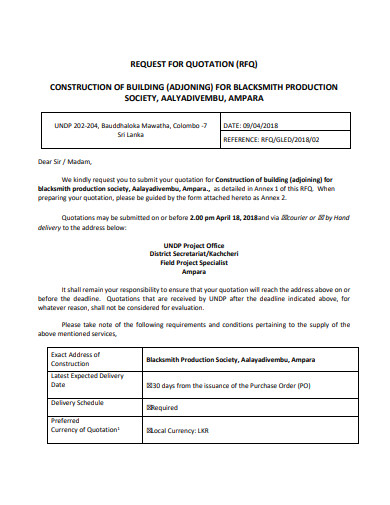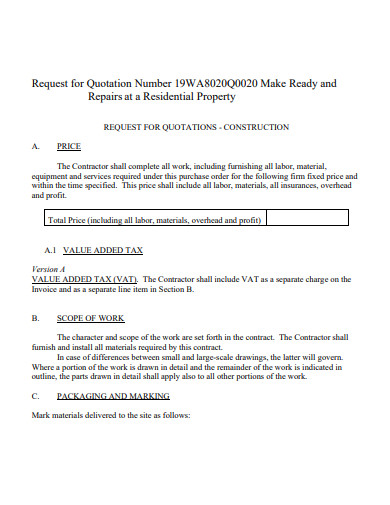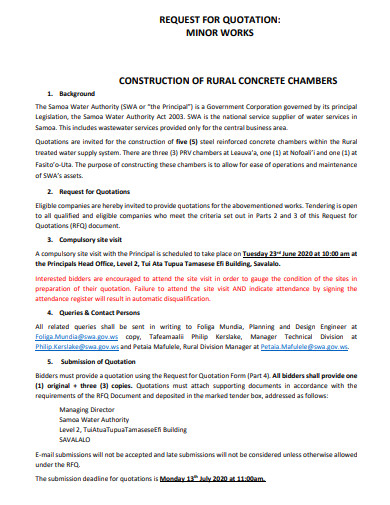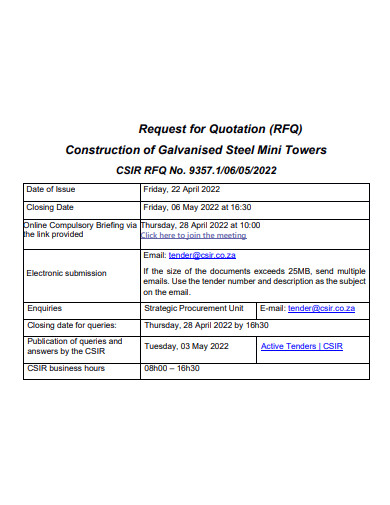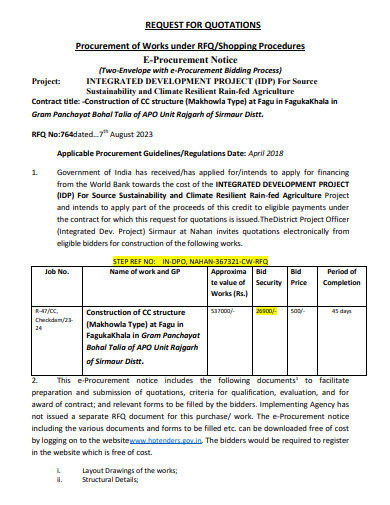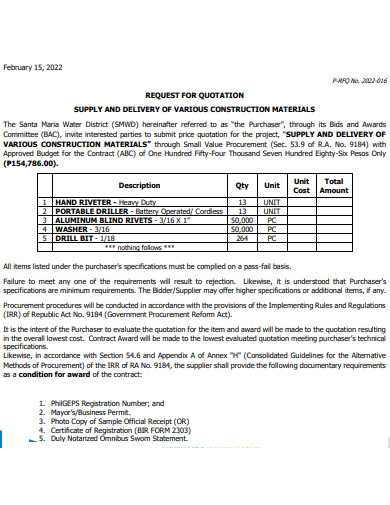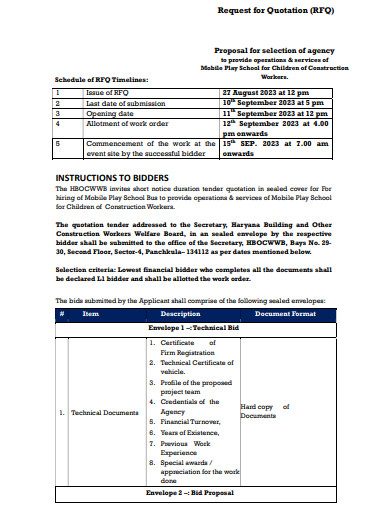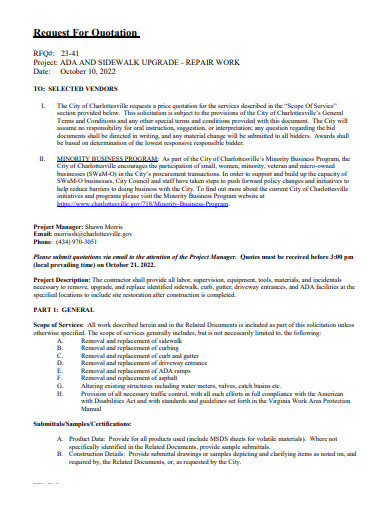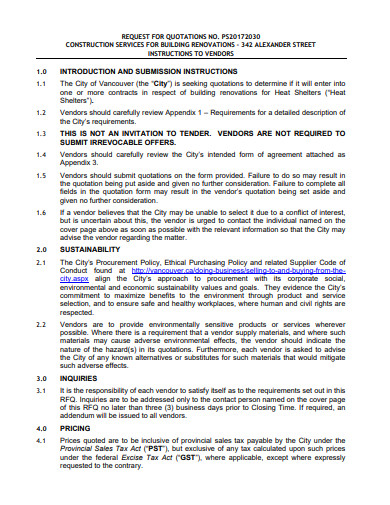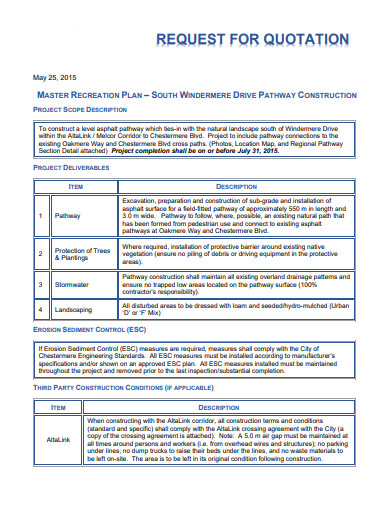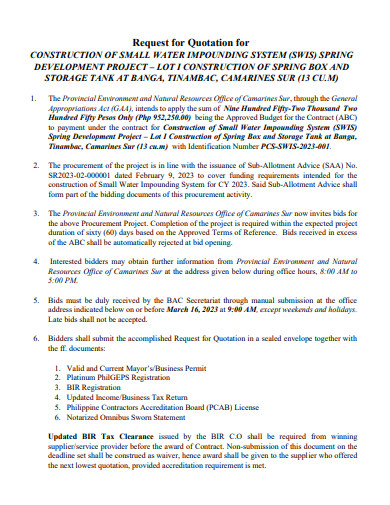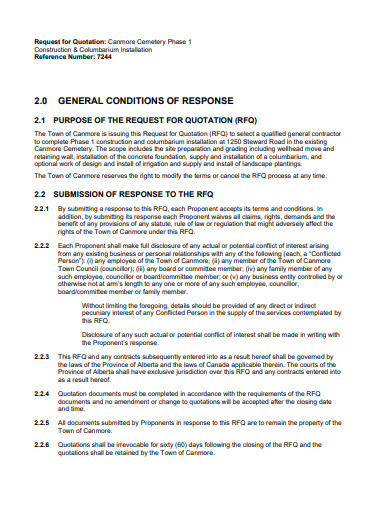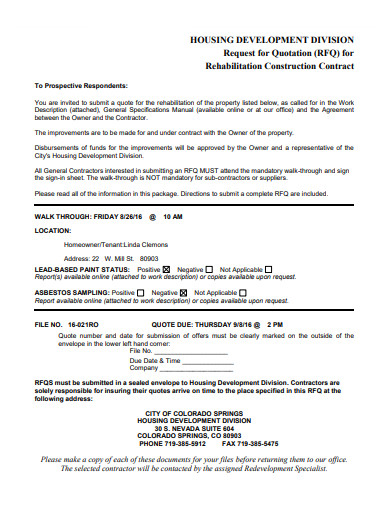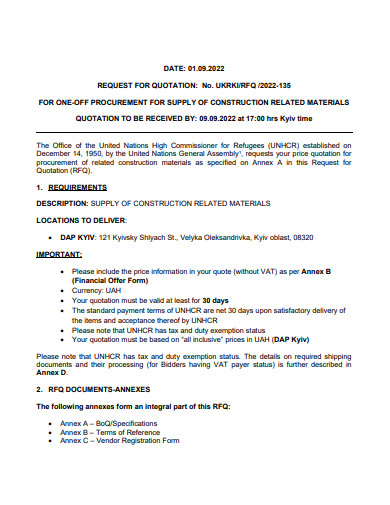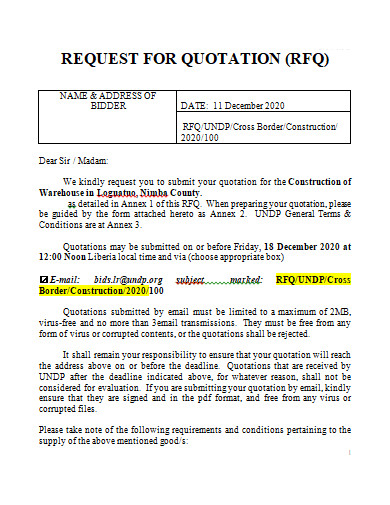Navigating the complexities of the construction industry requires a foundation of clarity and precision. A well-structured construction request for quotation (RFQ) is pivotal in this journey, serving as the bridge between project visionaries and expert contractors. Delving into the intricacies of a sample Construction RFQ can offer invaluable insights, ensuring that project bids align perfectly with expectations. Dive in as we unravel the elements of an effective RFQ, setting the cornerstone for construction excellence.
21+ Construction Request for Quotation Samfples
1. Quotation Template Bundle
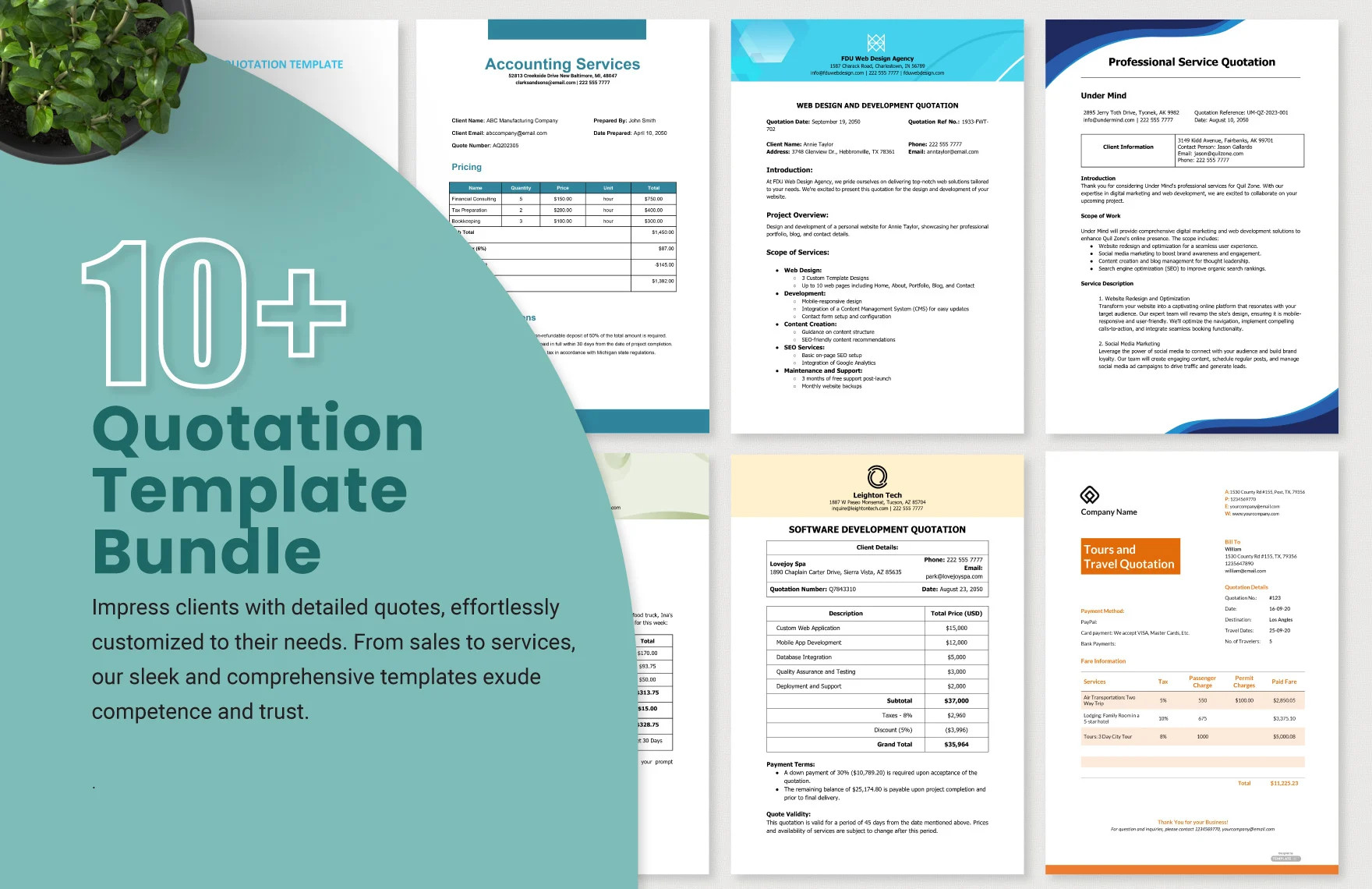
2. Construction Request for Quotation Template Bundle
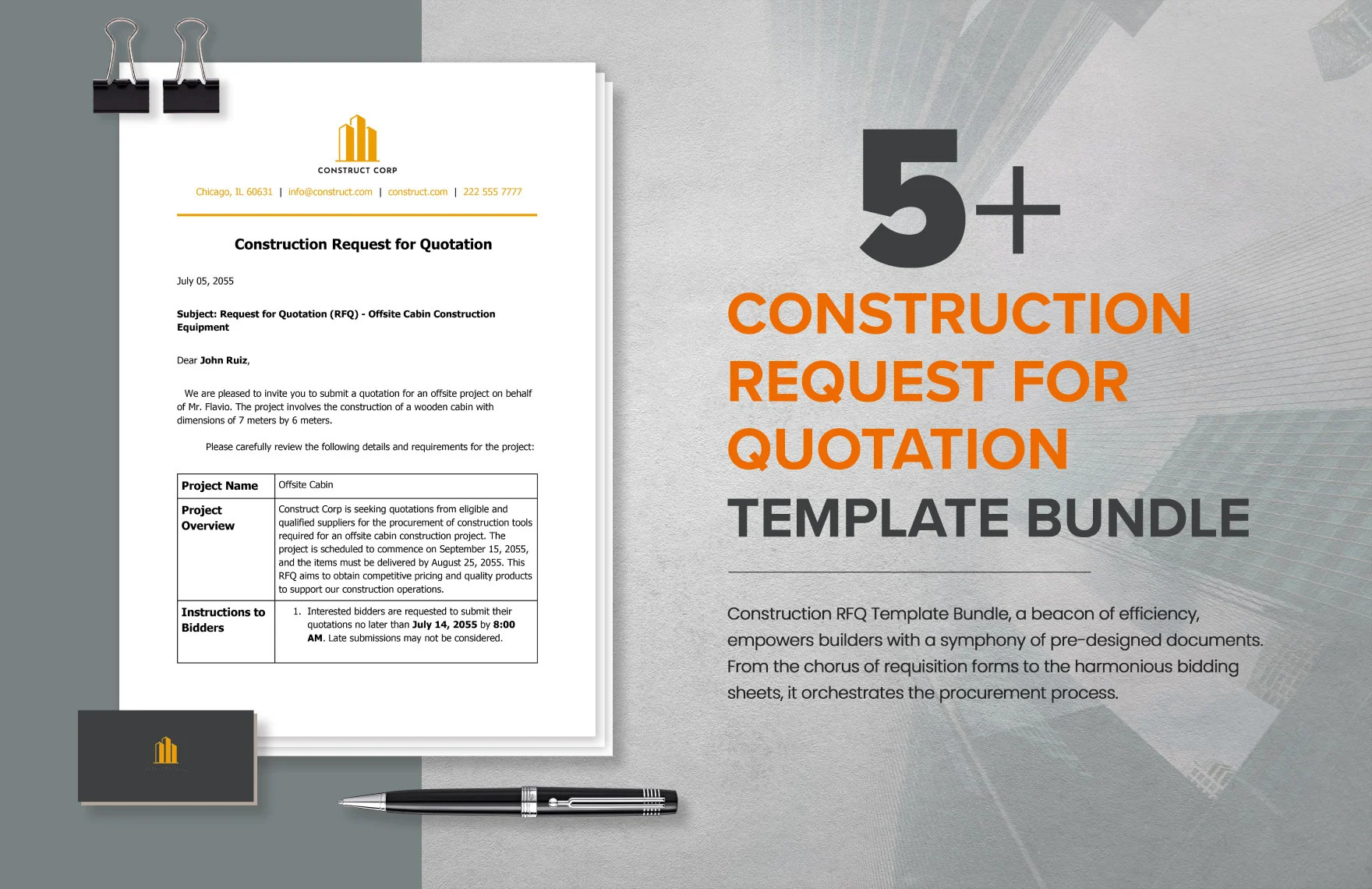
3. Construction Request for Quotation Template
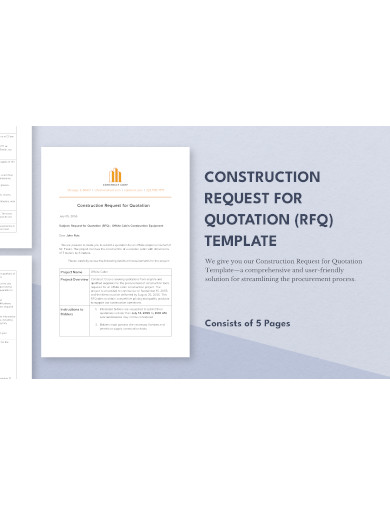
4. Industrial Construction Request for Quotation Template
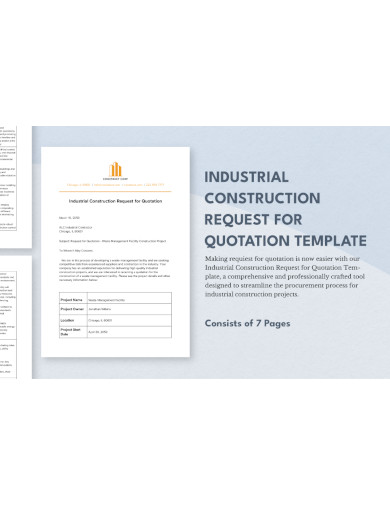
5. General Construction Request for Quotation Template
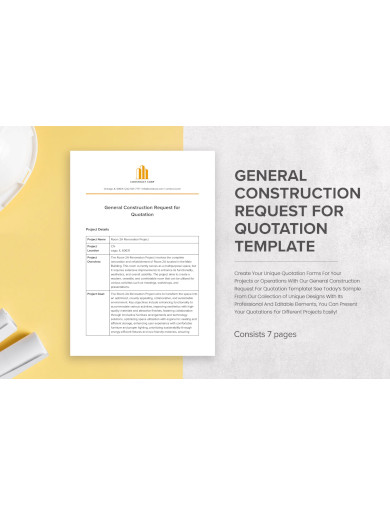
What is an RFQ in Construction?
Introduction to RFQ
An RFQ, which stands for Request for Quotation, is a standard document used in the construction industry to solicit bids for a specific project. Unlike its close relative, the RFP (Request for Proposal), which asks for a holistic approach and methodology, an RFQ primarily focuses on the cost associated with a predefined and detailed scope of work.
Role in Construction Projects
Within the construction realm, an RFQ serves a critical function. It provides potential contractors with the necessary details about a project, allowing them to calculate and submit a precise quote for their services.
Importance of Clear Specifications
For a construction project, the clarity in an RFQ can mean the difference between a project’s success and potential setbacks. Clear, detailed specifications ensure that contractors can provide accurate sample quotes and that there are no unexpected costs or misunderstandings once the project commences.
Tips for Managing the RFQ Process
Preparation is Key
Before embarking on the RFQ process, it’s crucial to gather all relevant information about the project. This means liaising with architects, engineers, and other stakeholders to ensure you have comprehensive details.
Choose the Right Contractors
Not every contractor will be suitable for every project. Consider the scale, specialty, and past performance of contractors before sending out an RFQ. This can help in receiving more relevant and competitive bids.
Communication is Crucial
Once the RFQ is sent out, open lines of communication with potential bidders. This will allow them to ask clarifying questions, ensuring that their quotes are as accurate as possible.
Review with a Critical Eye
Upon receiving quotations, don’t just consider the bottom line. Review each bid in detail, considering factors like the contractor’s experience, proposed timelines, past reviews, and of course, the overall cost. Sometimes, the cheapest bid might not be the best for your project in the long run.
Post RFQ Follow-up
After selecting a contractor based on the RFQ, it’s good practice to have a kickoff meeting to discuss the project’s nuances, ensuring both parties are on the same page.
I hope this guide provides clarity on the topics of RFQ in construction and managing the RFQ process. Remember, the goal of the RFQ process is to find the best match for your project, ensuring quality, timeliness, and cost-effectiveness.
6. Residential Construction Request For Quotation Template
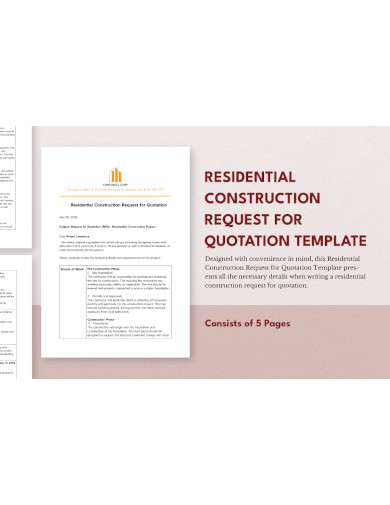
7. Commercial Construction Request for Quotation Template
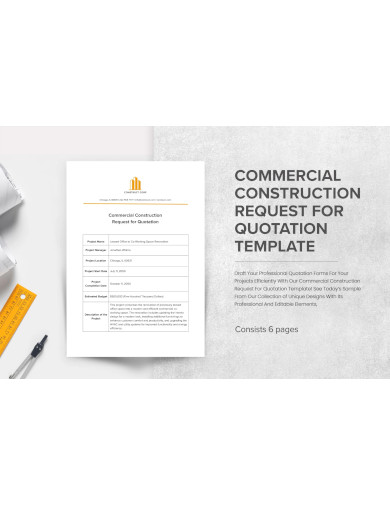
8. Construction of Building Request for Quotation Template
9. Sample Construction Request for Quotation Template
10. Construction of Rural Request for Quotation Template
11. Basic Construction Request for Quotation Template
12. Formal Construction Request for Quotation Template
13. Construction Materials Request for Quotation Template
14. Construction Workers Request for Quotation Template
15. Printable Construction Request for Quotation Template
16. Construction Services For Building Renovations Request for Quotation Template
17. Construction Request for Quotation in PDF
18. Simple Construction Request for Quotation Template
19. Construction Request for Quotation Example
20. Rehabilitation Construction Contract Request for Quotation Template
21. Standard Construction Request for Quotation Template
22. Construction Request for Quotation in DOC
Definition and How Businesses Use RFQs
Understanding the RFQ
An RFQ, or Request for Quotation, is a standardized business document that companies use to request external vendors and suppliers to bid on certain products or services. At its core, an RFQ lists out detailed specifications of what’s required, allowing potential suppliers to provide accurate pricing based on those details.
The Role of RFQ in Business
Businesses use RFQs as a procurement tool to gain a clear understanding of the market price for specific goods or services. By soliciting multiple quotations, companies can ensure competitive pricing and gauge the range of options available in the market.
Strategic Importance
Beyond just determining price, RFQs can be strategic. They can be used to identify potential long-term suppliers, assess market trends, and even encourage competition in the supplier market, leading to innovations and improvements.
How Requests for a Quote Work
Initiating the Process
The journey begins when a company identifies a specific need. This need could range from raw materials for manufacturing to specialized services. Once the need is defined and detailed, the company prepares the RFQ document.
Distributing the RFQ
The RFQ is then sent out to potential suppliers. This could be to a predefined list of trusted suppliers or more broadly to invite new potential suppliers to bid.
Receiving and Evaluating Bids
Suppliers respond to the RFQ with their quotes, detailing not just the price but often times, lead times, terms and conditions, and other relevant details. The company then evaluates these quotations, not just on price, but on overall value, reliability, and the supplier’s track record.
Steps to Writing the Perfect Request for Quotation
Define with Clarity
Start with a clear and comprehensive description of what you’re looking for. This includes technical specifications, quantities, and any other pertinent details. The clearer your request, the more accurate the quotes.
Set Timelines
Include both the deadline for submitting quotes and the expected timeline for delivery or project completion. This helps potential suppliers assess if they can meet your requirements within the given timeframe.
Outline Evaluation Criteria
Let suppliers know how their quotes will be evaluated. It’s not always about the cheapest price. Factors like quality, past performance, and delivery times play a significant role.
Terms and Conditions
Clearly spell out any terms and conditions, including payment terms, warranties, or penalties. This will ensure there are no misunderstandings later on.
Feedback and Review
Once you’ve received sample quotations, take the time to provide feedback to suppliers. Even if you don’t choose a particular supplier, constructive feedback can help improve future RFQ processes and supplier relations.
These sections provide a solid foundation on the concept and application of RFQs. Expanding on each section can provide further depth and practical insights for businesses looking to harness the power of the RFQ process.
Construction Request for Quotation (RFQ) is essential for any successful construction endeavor. Embracing a well-structured RFQ not only ensures competitive pricing but also fosters clarity and alignment between stakeholders. As businesses aim for project excellence, leveraging the power and precision of RFQs becomes an invaluable tool in their construction procurement arsenal.
Related Posts
FREE 10+ Inspirational Quote Sample in PDF
FREE 50+ Quote Samples in MS Word | Google Docs | Google Sheets | Excel | PDF
FREE 10+ Blank Quote Samples in PDF
FREE 10+ Sales Quote Samples in PDF
FREE 10+ Landscaping Quote Samples in PDF
FREE 10+ Price Quote Samples in PDF
FREE 10+ Cleaning Quote Samples in PDF
FREE 10+ Business Quote Samples in PDF
FREE 10+ Electrical Quote Samples in PDF
FREE 10+ Commercial Quotation Samples in MS Word | Google Docs | Google Sheets | MS Excel | PDF
FREE 10+ Marketing Quotation Samples in MS Word | Google Docs | Google Sheets | MS Excel | PDF
FREE 10+ Work Quotation Samples in MS Word | Google Docs | Google Sheets | MS Excel | PDF
FREE 10+ Building Quotation Samples in MS Word | Google Docs | Google Sheets | MS Excel | PDF
FREE 10+ Exhibition Quotation Samples in MS Word | Google Docs | Google Sheets | MS Excel | PDF
FREE 10+ Request For Quotation Samples in MS Word | Google Docs | Google Sheets | MS Excel | Apple Numbers | Apple Pages | PDF

